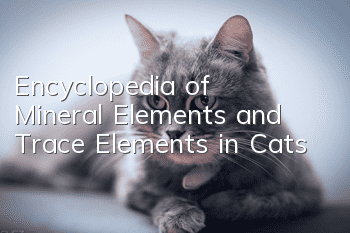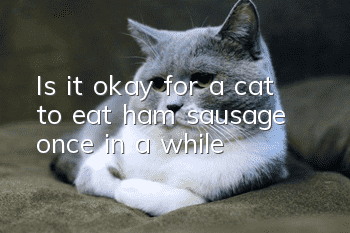Encyclopedia of Mineral Elements and Trace Elements in Cats

70% of the total mineral content in cats is calcium and phosphorus. Roughly 99% of calcium and 80% of phosphorus make up bones and teeth, and the rest is found in body fluids and soft tissues. Trace elements in cats only include iron, copper, cobalt, iodine, manganese and zinc.
Clinical studies have also found that minerals play an important role in cats' growth and development, metabolism, blood coagulation, regulating the nervous system and maintaining normal heart activity. According to the different roles minerals play in cats’ bodies, minerals are divided into electrolytes, body structural components and trace elements.
First of all, healthy cats are not deficient in electrolytes. Only when a cat becomes ill and suffers from anorexia, vomiting, diarrhea, intestinal obstruction, etc. will the electrolyte balance be disrupted and become disordered. Excessive loss or imbalance of electrolytes in cats can even lead to death if not replenished and corrected.
Secondly, our common young cats may suffer from rickets, and adult cats may suffer from convulsions, spasms, paralysis, etc. These are caused by a lack of mineral elements such as calcium and phosphorus. In addition, if a nursing mother cat is deficient in calcium, it will not only affect herself, but the skeletal development of the nursing kitten will also be seriously affected.
Finally: regarding the main functions of other trace elements, as follows:
Iron, copper, and cobalt are closely related to hematopoiesis. Iron is an important raw material for the synthesis of hemoglobin. Iron deficiency can easily cause anemia in cats. Copper is necessary for normal iron metabolism and has a catalytic effect on the formation of heme and red blood cells. Cobalt is a component of vitamin B12 that plays an important role in protein metabolism.
Iodine is an essential component of thyroid hormone. If a cat is deficient in iodine, it will show slow growth, sparse coat, edema of the head, slow movement, dull expression, and difficulty in getting pregnant.
Manganese is the main component of several enzymes and is essential for the normal growth and reproduction of cat bones. If cats consume too much manganese, it can lead to leukoplakia and reduced conception rates.
Zinc is a component of several metalloenzymes and nucleic acids in cats, and is involved in the metabolism of amino acids to synthesize proteins. If a cat is deficient in zinc, symptoms such as weight loss, vomiting, conjunctivitis, hair fading, general weakness, and growth retardation will occur.
- It is important to take care of your cat’s eyes regularly. What special situations should you pay attention to?
- What are the characteristics of the Turkish Van Cat?
- How to stop cats from holding grudges?
- What should I do if my cat likes to drink toilet water?
- How to care for a pregnant female cat
- Will cat deworming collars poison cats?
- Why do cats urinate randomly? What are the reasons why cats urinate randomly?
- Is cat plague contagious?
- Are Siberian cats clingy?
- Don’t underestimate your cat’s whiskers, they can serve these functions!



